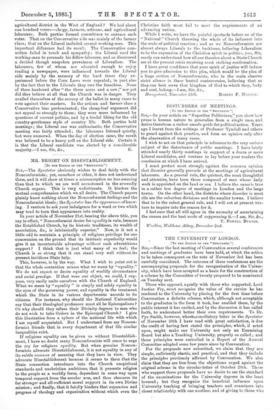MR. BRIGHT ON DISESTABLISHMENT.
[TO THE EDITOR OF THE " SPECTATOR."]
SIR,—The Spectator obviously wishes to deal fairly with the Nonconformists ; yet, somehow or other, it does not understand them, and it will show at times a misconception no less amazing than that to which we are well accustomed in the avowedly Church organs. This is very unfortunate. It hinders the mutual comprehension which we all desire. The Church papers plainly know nothing about the Nonconformist feelings and the Nonconformist ideals ; the Spectator has the appearance of know- ing. I venture to ask your indulgence for a word or two which may tend to turn that appearance into reality.
In your article of November 21st, bearing the above title, you say in effect, "Nonconformist desire for equality is vain, because the Established Ohara, by its historic traditions, its wealth of association, &c., is intrinsically superior." Now, is it not a little odd to maintain a principle of religious privilege for one 'communion on the ground that its intrinsic superiority would give it an incontestable advantage without such adventitious support ? I think that is just what many of us feel; the Church is so strong that it can stand very well without its present invidious State help.
This, however, is by the way. What I wish to point out is that the whole contention misses what we mean by "equality." We do not elpect or desire equality of worldly circumstance and social prestige. If that were our object, we could, I sup- pose, very easily unite ourselves with the Church of England. What we mean by " equality " is simply and solely equality in the eyes of the governing power, and equality in the treatment which the State in its various departments accords to its citizens. For instance, why should the National Universities say that their theological professors must all be Episcopalians ? Or why should they refuse their Divinity degrees to men who do not wish to take Orders in the Episcopal Church ? I give this illustration from a sphere of the national life with which I am myself acquainted. But I understand from my Noncon- formist friends that in every department of that life similar inequalities exist. If religions equality can be given us without Disestablish - ment, I have no doubt many Nonconformists will cease to urge the cry for religious equality. But when genuine Noncon- formists advocate Disestablishment, it is not equality in any of its subtle nuances of meaning that they have in view. They advocate Disestablishment because it seems to them that the State connection introdnces into the Church unspiritual standards and unchristian ambitions, that it presents religion to the people as a worldly force, dependent in some way upon temporal support from the secular arm, and thus obscures its far stronger and all-sufficient moral support in its own Divine mission; and finally, that it fatally hinders that expansion and progress of theology and organisation without which even the Christian faith must fail to meet the requirements of an advancing nation.
While I write, we have the painful spectacle before us of the " National " Church throwing the whole of its influence into the scale of political reaction ; and as we Nonconformists are almost always Liberals to the backbone, believing Liberalism to be the expression of the Christian spirit in politics, you, Sir, surely can understand how all our theories about a State Church are at the present crisis receiving most striking confirmation.
I have great confidence that your spirit of justice will induce you to give admission to this plea, which would be the plea of a huge section of Nonconformists, who in the main observe strict silence in these heated controversies, believing that so they can best serve that kingdom of God to which they, body and soul, belong.—I am, Sir, &c.,






































 Previous page
Previous page